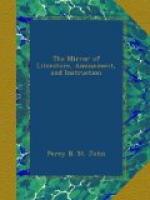SWAINE.
* * * * *
A Warning to Critics.—Zoilus, the critic, was called the rhetorical dog: rhetorical, as his style was elegant, and dog, from his practice of snarling.—Vitruvius tells us, that when he visited Alexandria, he recited his writings against the Iliad and Odyssey of Homer to King Ptolemy, which gave the king such offence, that he would take no notice of him; and afterwards, when, urged by indigence, he solicited charity, Ptolemy pulsed him with this contemptuous reflection, that if Homer, who had been dead one thousand years, could by his works give maintenance to many thousand people, a writer so much his superior might surely maintain himself.
P.T.W.
* * * * *
Some years since, an eccentric gentleman built himself a villa upon the brow of one of the loftiest of the Surrey hills, to avoid annoyance from the curious; but the odd situation of his residence drew scores of visiters. This reminds us of some lines by Cowley—
I should have then this only
fear,
Lest men, when they my pleasures see,
Should hither throng to live like me,
And so make a city here.
* * * * *
Imperial Ignorance.—Alexius Comnenus, Emperor of Constantinople, was an arrant dunce: Fuller says, “he hated a booke more than a monster did a looking-glasse; and when his tutor endeavoured to play him into scholarship, by presenting pleasant authors unto him, he returned, that learning was beneath the greatnesse of a prince, who, if wanting it, might borrow it from his subjects, being better stor’d; for (saith hee) if they will not lend me their braines, I’ll take away their heads!”
* * * * *
Party Spirit.—Fuller did not think party madness; for, he says such men as will side with neither party “hope, though the great vessel of the state be wrecked, in a private fly-boat of neutrality, to waft their own private adventure safe to the shore. But who ever saw dancers on ropes so equally poise themselves, that at last they fall not down and break their necks?”




